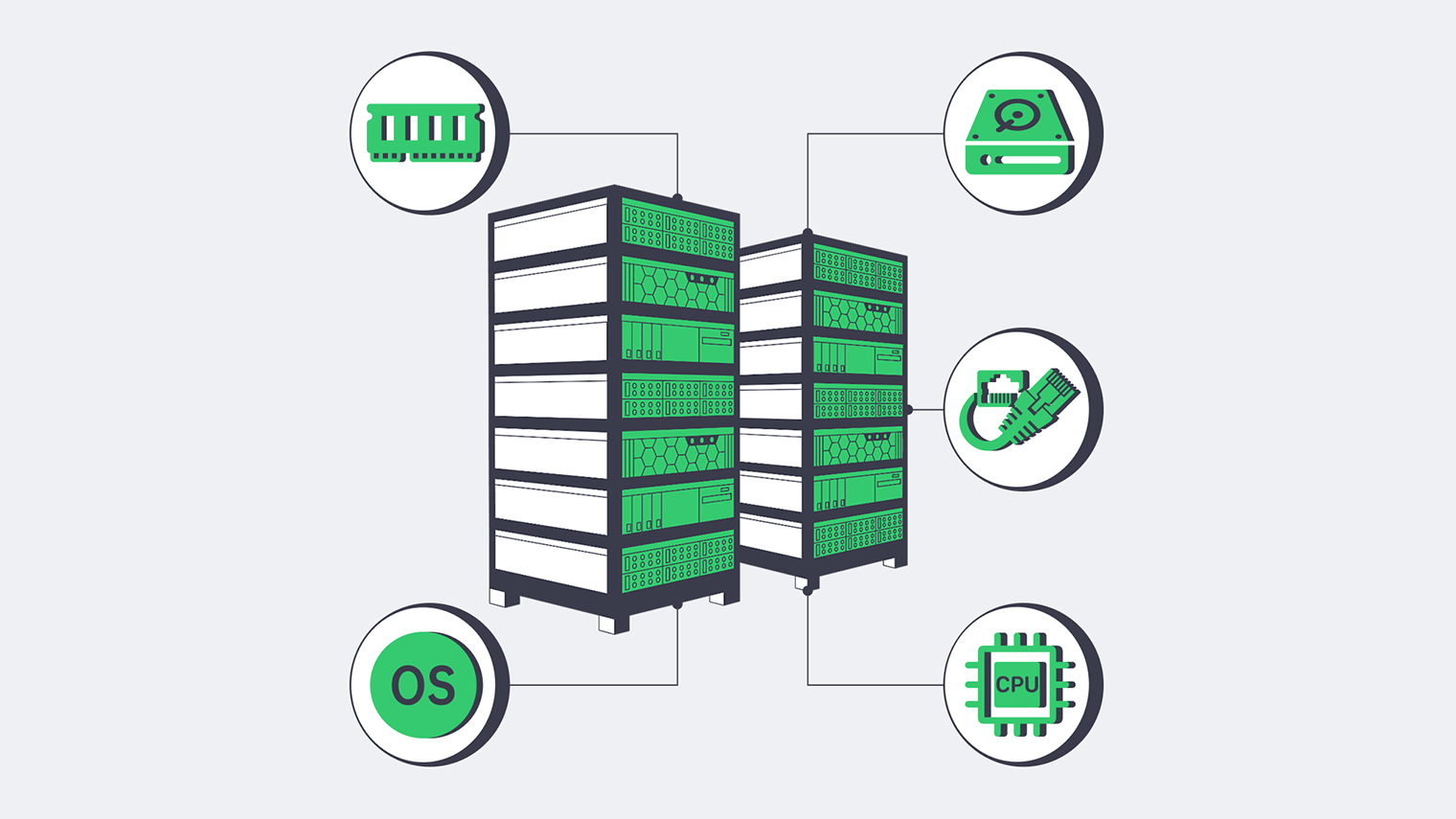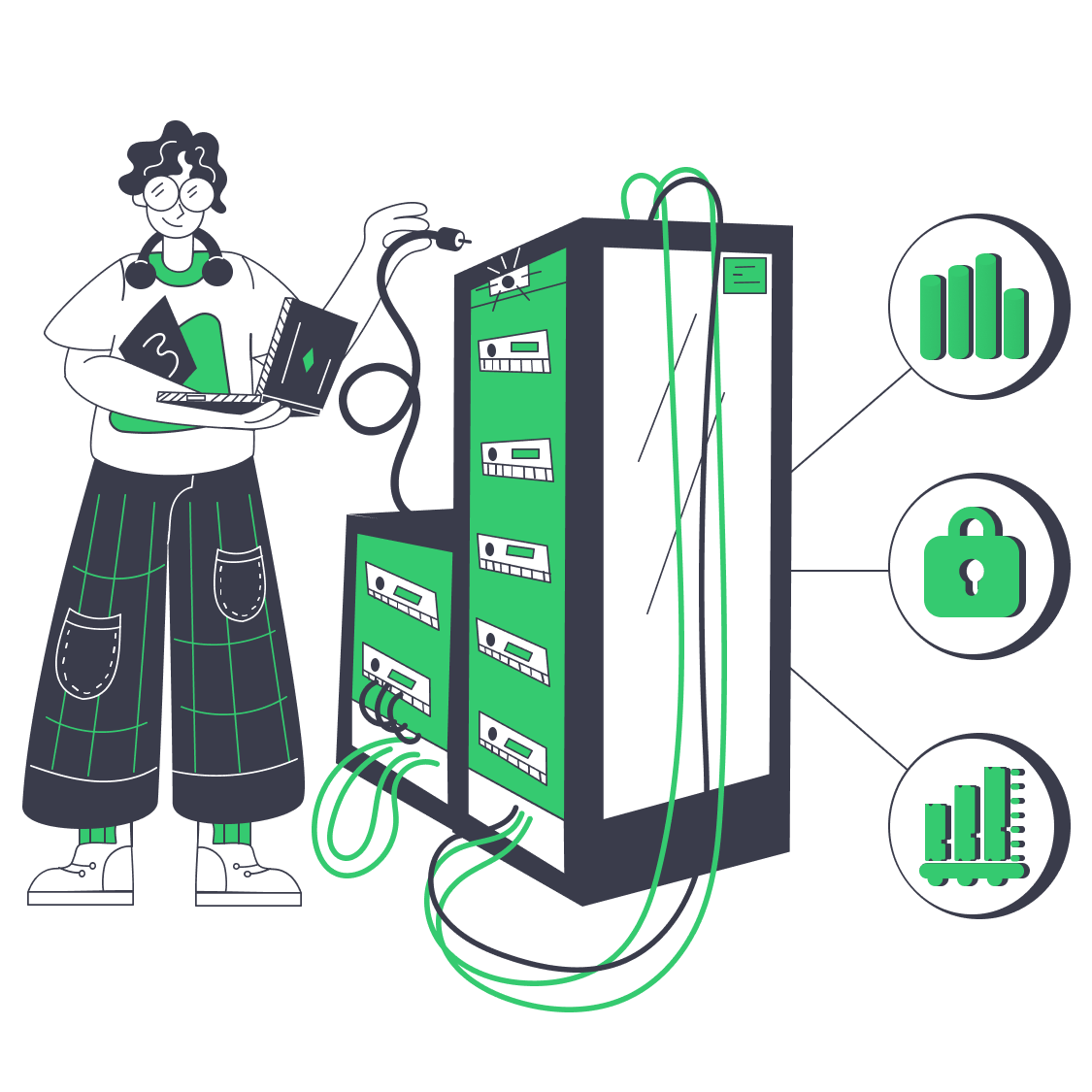Month: April 2025
Blog

Best Dedicated Server Builds for Streaming Services
Video streaming services face relentless pressure to deliver top-notch content worldwide. Whether it’s live events, training sessions, or on-demand shows, viewers expect zero buffering, minimal latency, and effortless scalability—especially at peak times.
Dedicated servers provide the performance and reliability to meet these high demands. Unlike shared environments that could often slow down under heavy loads, dedicated server clusters consistently handle demanding streaming workloads with ease.
Choose Melbicom— 1,300+ ready-to-go servers — 21 global Tier IV & III data centers — 55+ PoP CDN across 6 continents |
 |
What Are the Pitfalls of Non-Dedicated Streaming Infrastructure?
Without dedicated servers, video streaming services could face a number of serious issues that can negatively impact your viewers and your bottom line.
Buffering and Latency
Buffering and latency are among the most universal headaches in video streaming, especially in shared environments. High viewer traffic can overwhelm shared resources, causing delays in data transfer. Repeated pauses and loading screens lead to user frustration, decreased watch times, and lower viewer retention rates. This issue becomes particularly acute during live events, where even small delays can disrupt the real-time experience and tarnish your reputation.
Resource Competition
In a shared environment, multiple tenants vie for limited CPU, RAM, and bandwidth, creating a constant tug-of-war for essential computing resources. When viewer traffic increases, these contested resources can quickly become bottlenecks, causing service interruptions or degraded video quality. This unpredictability makes it difficult to plan for peak usage, forcing streaming providers to scramble for contingency solutions at the worst possible moments.
Resource Contention
Beyond mere competition, resource contention in shared setups introduces latency across the board. A sudden surge in usage by one tenant can hog CPU cycles or network bandwidth, leaving everyone else at a standstill. This directly translates into stutters, pixelation, and dropped frames for your video streams. In many cases, frustrated viewers abandon the service or switch to competitors offering smoother playback.
Technical Debt
Managing in-house streaming operations can accumulate technical debt over time. Outdated hardware, legacy software, and the constant need to implement performance upgrades stretch internal teams thin. This often results in spiraling maintenance costs and a lack of agility in adopting new technologies. The strain on engineering resources can slow feature rollouts and hamper the overall growth of your streaming platform.
How to Deliver Top-Notch Video Streaming with Dedicated Servers
By contrast, dedicated servers provide a robust foundation that addresses the pitfalls outlined above. Below are key benefits that make dedicated servers indispensable for streaming services.
Seamless Performance with Exclusive Resources
With dedicated servers, you have exclusive access to CPU, RAM, and bandwidth—no more competing with other tenants for vital resources. This translates directly into smoother video streams with fewer buffering incidents and stable playback even during audience surges. The ability to optimize server performance for your specific encoding and decoding needs ensures consistently high-quality output.
Low Latency and Network Optimization
Dedicated servers often come equipped with network optimization technologies like BBR (Bottleneck Bandwidth and Round-trip Propagation Time). These optimizations help reduce round-trip times and minimize packet loss, vital for live events and real-time interactions such as sports broadcasts, Q&A sessions, and online gaming streams. The result is an immersive viewer experience with minimal lag or delay.
Enhanced Security with Dedicated Environments
In a dedicated hosting scenario, you maintain complete control over the server environment. This includes the ability to customize firewalls, intrusion detection systems, and other security protocols to safeguard your video content. With no co-tenants sharing the same hardware, the risk of breaches originating from adjacent workloads is significantly lower, further protecting your brand and user data.
Easy Scalability to Adapt to Growing Demand
Scaling dedicated resources is straightforward—adding more CPU cores, RAM, or increasing network capacity can be done seamlessly. This flexibility ensures you can handle increases in viewer traffic, special events, or rapid audience growth without sacrificing stream quality. The ability to respond quickly to market demands makes dedicated servers a future-proof investment for any streaming operation.
Which Dedicated Server Specs Matter for Video Streaming?

Every streaming platform faces unique hurdles when delivering video content—from managing massive bandwidth demands to minimizing latency and downtime. That’s why a hosting provider that truly understands these challenges is essential. With 1,300+ servers ready for activation in under two hours, a global presence across 21 data centers, plus guaranteed bandwidth and DDoS protection, Melbicom offers the reliable infrastructure you need for seamless streaming. Below are our general recommendations to guide your dedicated server decisions.
| Component | Recommendation |
|---|---|
| CPU | Multi-core processors like Intel Xeon with 16+ cores for effective video encoding and decoding |
| RAM | Minimum 64 GB, ideally more for handling multiple streams simultaneously |
| Storage | NVMe SSDs for rapid data access and smooth video delivery |
| Bandwidth | 1 Gbps to 20 Gbps, depending on audience size and quality needs |
How to Get Started with a Dedicated Server for Video Streaming
Dedicated servers are the secret sauce to delivering a flawless, high-quality streaming experience, and Melbicom makes it effortless to get started. With dedicated servers strategically located in data centers across the globe, you can count on low latency and top-tier performance for your viewers, no matter where they are. Melbicom’s powerful and scalable solutions keep your streaming service running smoothly, helping you create an experience your audience will love—and keep coming back for.
Rent your dedicated server for video streaming network at Melbicom and give your audience the flawless experience they expect and deserve.
Get expert support with your services
Blog

Rent Database Server: Dedicated Hosting for Performance & Control
Databases are the core of modern business ops, handling everything from customer records to financial transactions. As companies expand, their database needs grow, demanding a robust and high-performance hosting solution. In an era where data-driven decisions and stringent compliance regulations are paramount, selecting the right hosting infrastructure becomes essential. Dedicated servers deliver the reliability, efficiency, and control required for seamless database hosting, ensuring your data remains accessible and secure. Whether you’re running MySQL, MongoDB, or PostgreSQL, dedicated servers are designed to meet your needs.
Choose Melbicom— 1,300+ ready-to-go servers — 21 global Tier IV & III data centers — 55+ PoP CDN across 6 continents |
 |
What Are the Drawbacks of Non-Dedicated Database Hosting?
Relying on shared infrastructure introduce several issues that can compromise the performance and security of critical databases
Resource Contention
In shared environments, databases must compete with other users for CPU, memory, and bandwidth. This can lead to severe performance bottlenecks, especially during peak periods, when resources are stretched thin. For businesses running high-demand applications, this lack of dedicated resources can result in slower response times and frustrated users.
Moreover, unpredictable resource availability can disrupt database operations, causing query delays or timeout errors. This inconsistency is a significant risk for enterprises that depend on uninterrupted database performance to meet their operational needs.
Limited Control
Shared infrastructure comes with standardized configurations that limit customization options. Businesses may struggle to optimize server settings for specific database needs, such as MySQL, which requires tailored my.cnf tuning, or MongoDB, which performs best with Linux and specific file systems like XFS.
The inability to modify the environment to suit these requirements often results in suboptimal performance. For organizations relying on custom database configurations, this limitation can hinder efficiency and scalability.
Security Risks
Sharing server resources means sharing vulnerabilities. A security incident affecting one user could potentially impact all users on the same server. For businesses handling sensitive data, such as customer information or financial records, this lack of isolation is a serious concern.
Furthermore, compliance with data protection regulations like GDPR or HIPAA becomes challenging in shared environments. Without full control over server security measures, businesses face increased risks of breaches and regulatory penalties.
How Do Dedicated Servers Improve Database Hosting?
Consistent High Performance
With a dedicated server, your database enjoys exclusive access to CPU, RAM, and storage. This ensures consistent, high-performance operations without the disruptions caused by resource contention. For example, dedicated resources allow for faster query execution and reduced latency during peak workloads.
Additionally, the ability to fine-tune hardware and software configurations means you can optimize your setup for specific database workloads. Whether it’s MySQL, MongoDB, or PostgreSQL, dedicated servers provide the flexibility needed to maximize performance and operational efficiency.
Enhanced Security and Control
Dedicated servers offer unparalleled security by isolating your database from other users. This isolation minimizes the risk of external vulnerabilities affecting your operations. Businesses can implement custom firewalls, encryption protocols, and access controls tailored to their specific needs.
For industries like banking and healthcare, where data protection is critically important, dedicated servers ensure compliance with stringent regulatory requirements. With full control over your infrastructure, you can establish robust security measures that safeguard sensitive information.
Scalability and Reliability
Dedicated servers provide a scalable foundation for growing businesses. Whether you need to store massive datasets or support a high volume of concurrent users, dedicated infrastructure can handle the load without compromising performance.
In addition, reliability is a key advantage. With dedicated hardware, you can configure redundancy systems and backups to ensure data availability even in the event of hardware failures. This level of dependability is essential for mission-critical database applications.
What Are the Technical Requirements to Buy a Database Server?

Every organization grapples with unique challenges when hosting databases—from managing massive data throughput to ensuring compliance with regulatory standards and minimizing downtime. A hosting provider that understands and addresses these challenges is essential. Melbicom offers a robust infrastructure tailored to meet these needs. With 1,300+ servers ready for activation within two hours, a global presence spanning 21 data centers, and added features like guaranteed bandwidth and DDoS protection, you can count on a solid foundation for seamless database operations. Below, we share general recommendations to guide your database hosting decisions.
| Component | Recommendation |
|---|---|
| CPU | Multi-core processors like Intel Xeon for handling complex database queries |
| RAM | Minimum 64 GB to support efficient database performance and reduce query response times |
| Storage | NVMe SSDs for rapid data access, or HDDs with RAID configurations for added redundancy |
| Bandwidth | High bandwidth (1 Gbps or more) for smooth data access for multiple concurrent users |
Dedicated servers offer a secure and scalable platform for database hosting while allowing complete customization to suit your specific requirements. From handling massive datasets to implementing advanced redundancy systems, dedicated servers provide the versatility needed for optimal database management. If you’re searching for the best MySQL hosting service or planning to invest in a reliable server for your database, Melbicom offers best dedicated servers from industry-leading vendors to ensure exceptional performance and reliability.
Looking for the perfect server to host your databases? Melbicom has you covered with a wide range of dedicated server solutions designed to meet your specific needs.
Get expert support with your services
Blog

Dedicated Servers for Data Backups
Backing up your data is no longer optional. No matter how large or small a business is, having a reliable strategy to protect critical information is essential. Why? Because the stakes are high. Ransomware incidents have surged in recent years, and a single attack can grind your operations to a halt. That’s why dedicated servers are so valuable—they let you take complete command of your backup process. In contrast to shared environments, they’re faster, more dependable, and far more secure.
Choose Melbicom— 1,300+ ready-to-go servers — 21 global Tier IV & III data centers — 55+ PoP CDN across 6 continents |
 |
What Are the Drawbacks of Non-Dedicated Backup Solutions?
Without a dedicated backup infrastructure, businesses often rely on shared solutions—such as VPS or on-site storage (e.g., NAS devices, RAID arrays, or local servers)—that carry notable risks.
Security Vulnerabilities
In partial infrastructure environments, your backups sit alongside other users’ data, exposing your organization to vulnerabilities stemming from their potential security missteps. Meanwhile, on-site storage systems may not offer sufficient protection against external attacks, physical damage, or theft, further endangering critical information.
The absence of dedicated hardware also limits your ability to implement strict access controls, custom firewalls, and comprehensive encryption. A single misconfiguration by another user can create security loopholes that jeopardize your data, making it far more challenging to uphold the high security standards demanded by modern businesses.
Unpredictable Performance
Resource contention is another major hurdle. In a shared infrastructure, multiple users compete for CPU power, memory, and storage bandwidth, leading to unpredictable performance—particularly during peak periods. As a result, backup jobs may take longer than planned or fail to complete on time, putting crucial restore points at risk.
Meeting RPOs (Recovery Point Objectives) and RTOs (Recovery Time Objectives) becomes increasingly difficult when backup operations are slowed by fluctuating network speeds and storage constraints. In the event of a disaster, these unstable conditions can result in extended downtime, undermining productivity, customer satisfaction, and your organization’s reputation.
Limited Customization and Compliance Hurdles
Many shared solutions impose strict constraints on software installations, server configurations, and advanced security features. This lack of flexibility prevents you from customizing encryption, firewalls, or specialized backup applications to meet specific requirements, often forcing organizations to settle for less robust solutions.
Compliance obligations can complicate matters if the hosting provider won’t let you explicitly specify the data center’s geo location. For businesses under data sovereignty regulations, this limitation can lead to non-compliance, risking legal consequences. With limited options to ensure data residency, aligning infrastructure with regulatory expectations becomes more difficult.
How Do Dedicated Backup Servers Improve Security, Performance & Compliance?
Robust Security
Opting for dedicated servers grants you unparalleled control over your backup environment. You can implement specialized firewalls, end-to-end encryption, and other defense mechanisms tailored to the sensitivity of your data. This level of customization significantly lowers the risk of unauthorized access, data breaches, or other security incidents that could harm your operations.
Another advantage of dedicated hosting is the ability to maintain redundant storage solutions, such as RAID configurations, for extra data protection. This ensures that backups remain intact even if hardware components fail. With full oversight of the server’s security framework, you can create a multi-layered defense strategy designed around your specific threat landscape, giving you comprehensive peace of mind.
Performance and Scalability
Dedicated servers eliminate resource-sharing bottlenecks by reserving computing power, memory, and storage capacity solely for your backup processes. Predictable performance allows you to plan and execute backups within set windows, making it easier to stay on schedule and maintain the level of data integrity your business demands.
Because the server’s resources belong exclusively to you, scaling is straightforward as data volumes increase or business objectives evolve. You can expand your storage capacity or upgrade CPU and RAM without shifting to a completely different hosting solution. This streamlined approach to growth ensures that your backup infrastructure can adapt quickly to changing needs, all while maintaining consistent reliability.
Compliance and Customization
Dedicated servers empower you to create an environment specifically tailored to meet industry standards, security protocols, and evolving data protection requirements. This control is particularly vital for companies operating under strict regulations that demand strong encryption, thorough logging, or rigorous auditing procedures. Since you oversee every layer of the server setup, you can ensure no compromises are made in the pursuit of full regulatory compliance.
Additionally, you can often select from multiple data center locations worldwide when using dedicated servers. This freedom of choice helps address data sovereignty laws that mandate local storage or prohibit certain cross-border data transfers. The result is a highly secure backup environment that meets all functional needs while satisfying legal and regulatory commitments.
Which Specifications Matter for a Dedicated Backup Server?

Every organization grapples with unique challenges—massive data throughput, regulatory complexities, uptime demands. A hosting provider that can adapt to these needs is vital.
Melbicom offers an infrastructure designed for flexibility. With 900+ servers ready for activation within two hours, global coverage across 15 data centers, and extras like guaranteed bandwidth and DDoS protection, you have a strong foundation to keep backups running smoothly.
| Component | Recommendation |
|---|---|
| CPU | Multi-core processors like Intel Xeon for efficient handling of backup workloads |
| RAM | Minimum 64 GB to ensure smooth data transfer and handle large datasets effectively |
| Storage | Use NVMe SSDs for fast read/write speeds, or HDDs with RAID for cost-effective redundancy |
| Bandwidth | High bandwidth (1 Gbps or more) to support timely backups without network congestion |
How to Choose the Best Dedicated Server Hosting for Backups
Dedicated servers give you a rock-solid, secure, and scalable foundation for managing your data backups. They also let you shape your environment exactly how you need it. Whether you’re storing huge datasets or building complex redundancy systems, you’ve got the tools to create a solution that fits your business perfectly.
Not using dedicated servers for your backups yet? Melbicom is here to back you up with top-tier dedicated server solutions from the most trusted vendors in the industry.
Get expert support with your services
Blog

Dedicated Servers for SaaS: Fast and Secure Application Hosting
For modern product teams and their DevOps workflows, microservices and containers have become the standard. But the real question is: what are the best hosting options for the job? What do on-premises, SaaS, and mobile app hosting servers really need to deliver?
For those seeking to maximize performance and control costs, dedicated servers offer a compelling answer. Unlike virtual private servers (VPS) or shared environments, dedicated servers deliver raw power and complete customization, ensuring optimal performance.
Choose Melbicom— 1,300+ ready-to-go servers — 21 global Tier IV & III data centers — 55+ PoP CDN across 6 continents |
 |
What Challenges Do Product Teams Face with Non-Dedicated App Hosting?
Relying on VPS for application hosting introduces significant limitations that can hinder performance, control, security, and scalability—essential factors for delivering a seamless and reliable user experience.
Resource Contention
In shared environments, CPU, memory, and disk I/O resources are distributed among multiple users, leading to unpredictable performance during peak times or when neighboring tenants demand high resources. This inconsistency disrupts workflows and creates bottlenecks, frustrating developers and degrading the end-user experience.
Performance Issues
Shared infrastructure struggles with the demands of complex or high-traffic applications, leading to latency, slower response times, and reduced throughput. These performance issues negatively impact user satisfaction and engagement, making VPS hosting unsuitable for applications requiring high availability or reliability.
Security Risks
Operating in a shared environment exposes applications to vulnerabilities such as cross-tenant data breaches and limited control over security measures. This lack of isolation increases the risk of compliance failures and jeopardizes sensitive data, making VPS hosting ill-suited for proprietary or mission-critical applications.
Benefits of Dedicated Servers for Cloud Application Hosting
Complete Control and Enhanced Security
Dedicated servers grant product teams full authority over the entire hosting environment. This flexibility enables custom configurations that align with unique business requirements, from optimizing specific software settings to deploying highly tailored firewalls and advanced intrusion detection systems. Such measures substantially reduce the risk of breaches, safeguarding sensitive data while maintaining strong compliance standards across industries.
Consistent, Predictable Performance
Dedicated servers redefine the hosting experience by eliminating the limitations often found in virtual environments. With exclusive access to hardware resources, they deliver steady, reliable performance—a crucial advantage for product teams running applications. By fine-tuning server settings, teams can achieve low latency, high availability, and the reliability necessary to keep mission-critical services running smoothly.
Seamless Scalability
Scalability stands out as another major benefit of dedicated servers. Whether expanding CPU power, memory, or storage, you can scale up effortlessly to meet changing application demands. Even in scenarios with complex architectures or large-scale workloads, additional nodes can form clusters, adeptly managing heavy traffic or intricate processes. From accommodating seasonal surges to supporting long-term growth, dedicated servers serve as a dynamic foundation that grows alongside your product ambitions.
Which Additional Services Strengthen App Hosting on Dedicated Servers?
Monitoring and Management Tools
Effective server monitoring ensures optimal performance and quick response to potential issues. Tools like Nagios, Zabbix, and Datadog provide real-time analytics, alerting administrators to resource bottlenecks, security threats, or downtime. Proactive management minimizes disruptions and keeps your applications running smoothly.
Backup and Disaster Recovery
Data loss can have devastating consequences for SaaS providers or on-premises applications. Dedicated servers support robust backup solutions, including automated daily backups and snapshot-based recovery. Disaster recovery options, such as off-site replication, ensure minimal data loss and rapid restoration in case of a failure, protecting both your data and your reputation.
Security Features
Dedicated servers offer advanced security features, tailored for SaaS and on-premises applications, such as:
- Custom Firewalls: Configured to meet specific application needs.
- DDoS Protection: Safeguards against distributed denial-of-service attacks.
- Encryption Protocols: Ensures data remains secure during transmission and storage.
- Access Controls: Limits access to authorized personnel only.
What Are the Technical Requirements for Dedicated Servers for SaaS?

When hosting applications, the specific requirements will vary based on factors like scalability needs, performance demands, and security considerations. Melbicom’s infrastructure is designed to support a wide range of use cases, providing flexibility and reliability. With 900+ dedicated servers ready for activation within two hours, global data center coverage, and features like guaranteed bandwidth and affordable DDoS protection, Melbicom offers an ideal starting point for evaluating your hosting needs.
| Component | Recommendation |
|---|---|
| CPU | Multi-core processors like Intel Xeon |
| RAM | Preferably 64 GB or more for better stability |
| Storage | NVMe SSD for fast read/write operations |
| Bandwidth | Minimum 1 Gbps, preferably 10 Gbps for high traffic |
| Data Centers | Choose providers with Tier III data centers as a minimum; for SaaS, consider a diversified data center network to distribute load across PoPs and improve performance for users in various locations |
Best Dedicated Server for Your Application Hosting
In the competitive landscape of SaaS and on-premises applications, infrastructure matters. Dedicated servers provide the performance, security, and scalability to meet the growing demands of modern applications. With providers like Melbicom offering tailored solutions, businesses can confidently scale, innovate, and deliver exceptional user experiences.
Ready to take your application hosting to the next level? Explore Melbicom’s dedicated server options and discover how they can empower your applications to thrive.